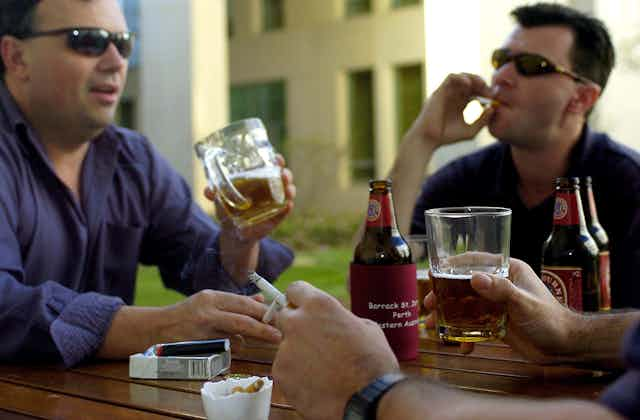Australian law prohibits the sale of alcohol to drunk people. Despite the shifting sands of alcohol policy, Responsible Service of Alcohol (RSA) legislation has remained a stalwart figure.
In Australia, RSA imposes mandatory training requirements for liquor industry workers to educate alcohol servers about signs of intoxication, when to refuse service, and the harms of over-service. Internationally, RSA training is considered a cost-effective strategy to reduce the sale of alcohol to drunk people.
However, there is little evidence that training alone reduces the propensity for over-service. It may have some effect when coupled with penalties for sales to drunk people and strict enforcement.
Given the longstanding restrictions on the sale of alcohol to intoxicated patrons, it seems perplexing that public drunkenness remains a notable problem – especially when we consider that public knowledge about RSA in Australia appears to be extremely high.
In the 2015 Global Drug Survey of alcohol and drug users, Australian respondents were overwhelmingly aware that it is illegal for bar staff to serve an intoxicated patron.
Awareness varied across states. South Australians were the least aware: 85.2% responded it was illegal to serve alcohol to a drunk person. Western Australians were most aware: 94.7% responded it was illegal.
In spite of this high awareness, a large proportion of respondents also agreed that a drunk person would be served alcohol in Australian licensed venues.
Again, agreement varied across states. In New South Wales, 45% of respondents agreed that a drunk person would be served alcohol. More than 60% of Victorian respondents agreed a drunk person would be served – despite the practice being illegal.
These statistics seem to suggest that current RSA legislation is effective in increasing public knowledge about responsible alcohol service of alcohol, but it may not be effective in deterring public drunkenness or encouraging responsible drinking in Australian bars and nightclubs.
Perhaps more worryingly, these statistics may indicate some patrons buy alcohol even when they are intoxicated, putting bar staff at risk of monetary penalty. There is no penalty for the patron – only for the alcohol server and the venue.
Combining training with law enforcement
In Australia, RSA was first introduced in NSW in 1830. Since then, it has been adopted across all jurisdictions.
In Australia, mandatory training is coupled with a legislative framework that imposes monetary penalties for the sale of alcohol to anyone who is unduly intoxicated.
Patrons are considered to be unduly intoxicated when their speech, balance, co-ordination and behaviour are noticeably affected, and there are reasonable grounds to believe it is due to alcohol and/or drug use.
In Victoria, WA, Tasmania, and NSW, it is also illegal for patrons to supply alcohol to another person or assist them in obtaining alcohol if the other person is intoxicated.
Penalties for over-service apply to licensees, managers and individual employees who serve alcohol to intoxicated patrons.
Monetary penalties for licensees range from A$7,850 (Tasmania) to $63,075 (Queensland).
Employees who sell alcohol to drunk patrons can be fined anywhere from $1,500 (ACT) to $11,000 (NSW).
Monetary penalties for patrons who supply alcohol to intoxicated individuals range from $1,100 (NSW) to $7,850 (Tasmania).
No states or territories impose jail time for the sale or supply of alcohol to intoxicated patrons. Despite long-existing legislation and the potential for heavy penalties, convictions are extremely rare.
Australia compares favourably on knowledge and laws
Compared to other countries, though, Australia appears to be performing well when it comes to alcohol and responsibility.
A recent paper with respondents from 19 countries found Australians were second only to New Zealand in relation to knowledge about the illegality of serving drunk patrons.
The research found that in countries where public knowledge is highest, respondents are least likely to agree that a drunk person will be served.
While public knowledge is not enough to stop service to drunk patrons, perhaps informal regulation or self-regulation is enacted through public knowledge. People are less likely to attempt to purchase alcohol when intoxicated if they are aware of the law. And alcohol servers are less inclined to serve drunks if they sense patrons are aware of the legislation and may report their behaviour.
Room for improvement
However, the variation in responses between Australia’s states and territories suggests there remains room for improvement.
Focusing on further refinements to the content and delivery of RSA training is unlikely to be the answer. While evidence regarding the effectiveness of RSA training is mixed, there are core limitations of this approach that cannot be tackled through better training methods.
RSA training provides knowledge to servers about signs of intoxication. But these may be difficult to identify in a bar or club where lighting is poor, noise levels are high, and the interaction between bar staff and patrons is brief.
Given the liquor industry’s core business is the sale of alcohol, it’s easy to see why licensees and bar staff may be conflicted when it comes to refusing service. Such an action will likely result in loss of profit, and may lead to outrage or conflict from patrons.
Finally, any systematic approach to enforcement is likely to be resource-intensive and costly. Convictions are difficult to achieve: this requires proof the server was aware of the patron’s intoxication level.
This is not to suggest Australia should do away with its current RSA legislation. Instead, this approach should be coupled with public discussion that encourages people to take responsible for their own drinking behaviour, rather than placing the burden on servers to set drinking limits for patrons.
This article was co-authored by Emily Kilpatrick, a masters student at the University of Queensland.

